
BLOG
On Being an Overcommitted Queen During Quarantine
This week’s Sovereign Standard is about coming face to face with overcommitment and over-functioning in the midst of this corona quarantine.
On Saturday night, thirty-five readers gathered together for The Sovereignty Knot online book launch. Watch it here!
It was magical. And it feels like it happened last year some time.
Since then, the inner journey has been long and hard. The scenery hasn't changed since then, of course, but things look and feel different inside my mind and heart.
For the past few weeks, I've been pushing myself at just about every level. You've seen those social media posts about how it's not essential to use a pandemic to be remarkably productive? I saw them and kept going, certain that those ideas applied to everyone else but me.
My queen was on overdrive, you see.
She saw those boxes of books in the hallway.
She thought about the storytelling course that begins April 14.
She thought about all the uncertainty in the world and how she needed to work harder to control what little she could.
Fortunately, I realized that my queen needed a time out before I totally burned out.
This week, I got back to my journal, to books I've longed to read, to being with the kids rather than managing them in between self-imposed deadlines. I cancelled any commitments I didn't have to keep.
I really didn't have a choice. My people (including my family in this house and accessible by Facetime, my friends on text, and my community of clients on Zoom) need me healthy and whole, not ragged and striving.
Getting my queen to share the burden (and the blessings) with my princess and my wise woman is a lifelong process, but I'm getting a little better at it every time I catch myself overpromising and overcommitting.
I become a little bit more Sovereign every time I say no, every time I limit the size of my realm.
During the book launch I promised a new webinar about using the archetypes of Sovereignty to tell your own stories.
Reality check: that's just too much for me right now.
Instead, I’ve called together a collection of resources that just might nurture you overcommitted soul as they have nurtured mine.
Good Read
During the book launch, I took you into the cave featured in chapter 2 of The Sovereignty Knot.
Briefly, I spoke of Mór, also known as the goddess Morrigan, and how she’s been a guide for me, particularly during these crazy time of disruption and fear. I’ve been staying close to her by reading Courtney Weber’s new book, The Morrigan: Celtic Goddess of Magick and Might. There’s nothing particularly “productive” about reading about Celtic deities right now. And that’s exactly what we need in order to get stronger and more connected to what matters - now, and in the new normal that’s waiting on the other side.
Good Listen
Goddess bless our public library systems with their extensive audiobook archives. When yet another spell of middle-of-the-night sleeplessness hits, I’ve been turning to The Magician’s Assistant by Anne Patchett. Written in 1998 and recorded back in the day when everyone listened on CD. There’s some terrible smooth jazz every hour or so and I imagine being a sophomore in college, driving between summer jobs, scratched discs all over the floor of my Ford Taurus.
An Invitation
There’s another reason I need to give my overcommitted queen a rest… there’s something big coming up in just 10 days. I am teaching Stand In Your Sovereign Story, an eight-week program designed to help creative entrepreneurs and transformation professionals tell stories that matter to them and to their marketing.
In some ways, it feels crazy to launch this right now, but it also seems like the perfect timing. If this feels like a time to focus on the stories you really need to tell and how to express them to the world, let's talk.
Initially, I conceived of this class as a way to "use the healing power of storytelling to discover your truth, share your authentic message, and build your world-changing business." Now, I see this course as existing to help us build world-renewing businesses.
How to balance “I must publish” and “I need to find a story that matters“
 Sovereign Standard, Issue 40
Sovereign Standard, Issue 40
The greatest epiphanies are just clichés - until they’re true
“You’ve had it in you all along” is one of those mundane epiphanies tossed about by countless gurus and charlatans, true healers and glitzy motivational speakers. And yet, the day you truly come to know this as your truth, it’s like the sunset, moonrise, and northern lights all fill the sky at once.
For years, I’ve been living out loud on the internet. Perhaps you’ve been like me - trying (and generally failing) to be an easy, breezy online writer. I refused to dumb down my message, but I also avoided a avoiding the hardest questions and denied the most personal answers.
Basically, I was so intent on saying something that I would rarely let myself slow down, look within, learn more, and ensure I was saying something that really mattered to me.
You’ve heard the old marketing adage “you aim to appeal to everyone and you appeal to no one”?
When you don’t feel free to tell the stories that are really important to you as a writer, you’re never going to tell stories that are important to the reader.
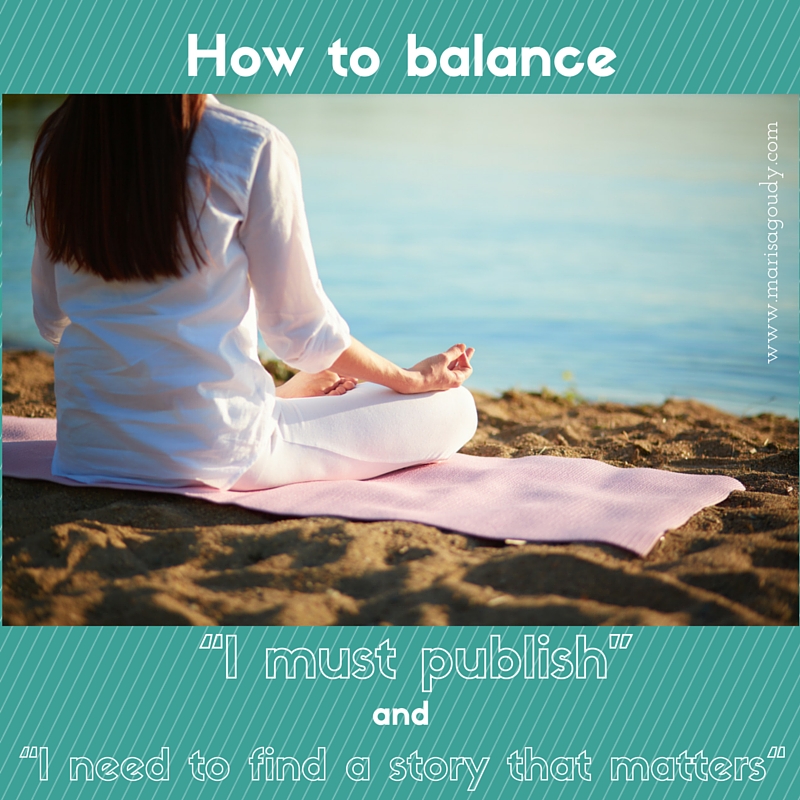 What it means to put the inner story first
What it means to put the inner story first
At last , I’m committing to prioritizing my interior process over the public conversation.
That means I'm committing to diving deeper, thinking longer, allowing ideas to germinate before I push myself to publish.
This isn’t a prescription for permanent radio silence. Heck, I'm blogging about my decision to putting the inner work before the public exploration of what I’ve learned!
The goal is not to become an all-analog hermit. Instead, it means I’m placing my creative emphasis on knowing a story at its intimate core before I bring it to an audience.
It means I ask myself questions that matter to me before I try to tell you why any of it might matter to you.
I’m exhausted by the pace of a digital world that puts action over contemplation. It feels good to play with phrases like:
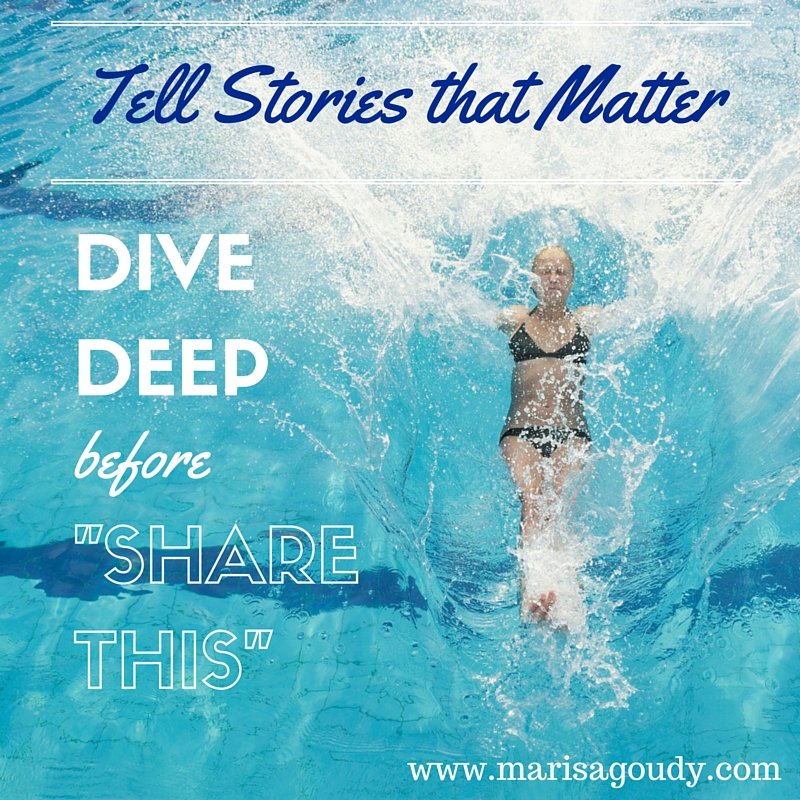 Perspective before performance.
Perspective before performance.
Introspection before exhibition.
Dive deep before ”share this!”
Finding the balance between finding the inner story and publishing it
As a writer who depends on building online community to build my business, deep dives into “what stories must I tell?” will cool my self-imposed “gotta publish at all costs!” madness.
But I know that the “explore the inner story” and “publish something now” is balancing act that puts other people on the opposite side of the teeter totter. (Thanks to my brave compatriots in the Quest 2016 community - see below.)
You might be a writer who loves to let a good idea simmer. It would be wonderful if my frantic "must create content!" experience makes you feel more secure in your slower-to-publish approach.
Many frantic writers wish they had your sense of trust and composure. Hopefully, you see that your ability to contemplate and craft your thoughts is a rare gift in this “get it out there” environment.
But, maybe you’re more of the “perfection = paralysis” kind of writer. You tend to over-think your work and start cleaning the bathtub with a toothbrush to avoid committing to a regular blogging schedule. I’d love my push to publish energy to rub off on you a bit.
It's good enough. Get it out there.
I know my 2015 commitment to the very-nearly-weekly Sovereign Standard is going to have a perpetual payoff, both personally and professionally. Even if I put the "real" story on the back burner while I tried to put out simpler messages intended to please the crowd.
Find the balance between the inner exploration and the greater conversation
Ultimately, if you're someone who wants to build a business through "content marketing" (telling stories and sharing your wisdom to entice new clients and delight your current community) or if you're a creative who must put ideas on the page, it's about striking a balance.
You need the inner exploration and you'll thrive when part a greater conversation.
If you'll excuse me, I need to get back to the stories still welling up inside me. But I promise I'll come back with ideas that will help you tell yours. Subscribe to my weekly Sovereign Standard newsletter - please?
*****
This post was initially inspired by Prompt #1 in Tracking Wonder's Quest 2016. The mastermind of this project, Jeffrey Davis, has called together 12 visionaries to help you create your best 12 months. It was a powerful way to begin my 2015 and I'm eager for this year's experience.
In particular, I was responding to Susan Piver who asked us to consider "What I most need to tell myself about 2016 is…"
Find more about Susan, the Quest, the business artist pledge, and how to join (it's totally free).
A story from the cave beneath the mountain of marketing and spin
Sovereign Standard, Issue 39 Right now, every fiber of my being (except for the fibers that are occupied with holding a toddler on my hip as I help my first-grader make turkeys out of candy corns and Oreos) is occupied with story.
Right now, every fiber of my being (except for the fibers that are occupied with holding a toddler on my hip as I help my first-grader make turkeys out of candy corns and Oreos) is occupied with story.
What does it take to translate the thoughts and emotions and in-process “stuff” into a story that engages, reveals collective insights, and exposes truths?
I don’t have the whole answer yet, but I’m getting closer.
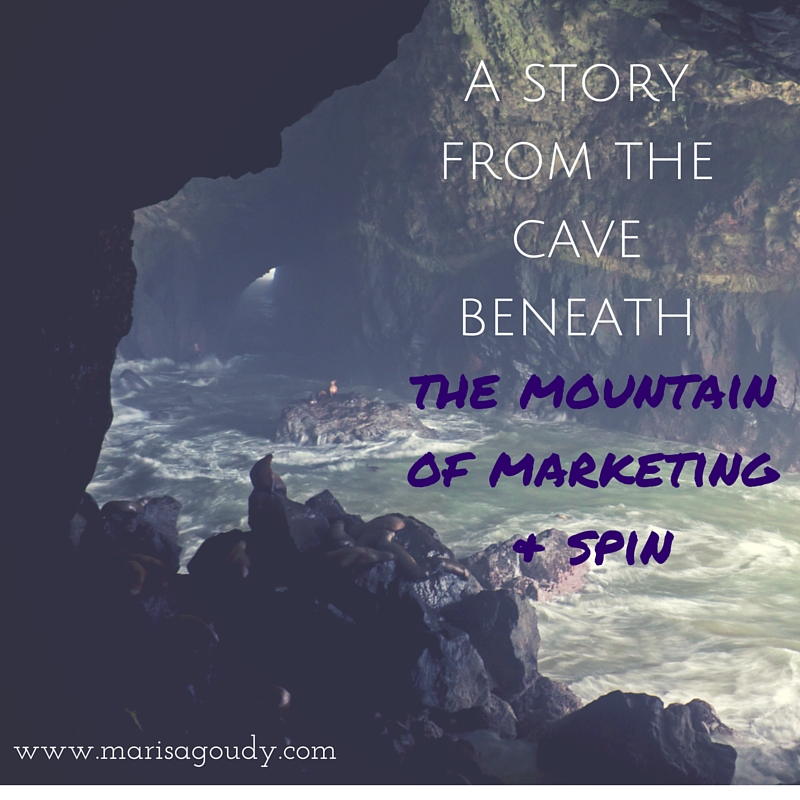 The best writing begins in private
The best writing begins in private
To allow myself the true freedom to wonder and wander, I’m dialing back my public writing. I've been pulling deep inside to where the really stories live. It's the place deep below the marketing and the spin - in the caves where the truth rubs elbows with fear and dreams struggle against despair.
[tweetthis]Story is born in caves where the truth rubs elbows with fear & dreams struggle against despair.[/tweetthis]
In a world where storytelling is celebrated as an art and foisted upon us as a marketing tactic, it’s easy to get burned out on story - particularly when you feel like you weren’t blessed with the Scheherazade gene.
I do believe that “everybody has a story” because it was reality long before it was a cliche (or the theme of a zillion ad campaigns). But there’s a lot more to unlocking natural storytelling abilities than shoving a mic or a blog password into someone's hand and commanding “have the courage to tell your story.”
The alchemy of turning "your stuff" into "Your Sovereign Story"
As 2015 dims to allow the new year to shine bright, I’ll have a great deal to say - and to offer - about this alchemical process of turning “your stuff” into “Your Sovereign Story.”
In the meantime, please give yourself permission to slow down and watch out for the unforgettable characters and plot twists (especially those who show up around your Thanksgiving table).
Begin to consciously collect the experiences that will give your stories life... I'll be back soon to help you figure out what to do with the material!
How to say the right thing when every word matters
MG_Header_w_biline_hires
Sovereign Standard, Issue 38Words are like playthings.
The amuse. They teach. They inspire. They’re the building blocks of story.
But words can also be discarded toys, spread all over the floor. Just more clutter. Meaningless and forgotten.
When mindful people (and professionals) use words mindlessly
How to say the right thing when every word matters. On writing and speaking your truth by Marisa Goudy.
Writers, healers, and clinicians whose work relies on talking it all through... Words are at the heart of what we offer. Even though language has its limits, we count on words to mean something.
And yet, I know I’m guilty of using words mindlessly.
Lapsing into profanity when I’m tired or “in a mood. ” Barking conflicting commands as I try to rally my first-grader to the bus stop. Just throwing together a bio for a social media profile without thinking about whether I am sharing the most important parts of my story.
Everyone has heard “do as I say, not as I do.” For many of us, “do as I do, not as I say” is often just as applicable.
In part, this refusal to "mind the mouth" is a stand against political correctness. It’s rebellion in the face of mindfulness.
Some of this mindless use of words is to be blamed on the influence of the culture - particularly when violence creeps into our metaphors.
And, frankly, sometimes it’s just exhaustion. It’s hard to keep track of every word when you're in a state of constant communication.
If some words matter, all words matter
I am compassionately declaring an end to my hypocrisy:
If some words have power, then all words have power. And I'm going to try my best to use my power wisely.
[tweetthis]If some words have power, all words have power. I'm trying to use my #writing powers wisely[/tweetthis]
The hurtful words and the healing words. All the language that falls in between that great spectrum of thought. Every word is important in the spells you cast, in the messages you’re sending out into the world.
“It’s just a throwaway comment” isn’t an excuse you can fall back on when you assert that words have power and resonance.
(Believe me, I am not completely happy about this pronouncement. The last thing I need are more rules or complications. But stick with me - there are lights every few feet along this tunnel into the underbelly of how we communicate!)
The resistance: nobody likes the word police
Engineers hate being married to English majors.
Oops… I just threw out “hate” and made a sweeping generalization there. I know it’s not really true. And I am almost sure that you know that I know it’s not true, but I wanted to get your attention and it felt like a fun, clever way to introduce this next point.
You see, paying close attention to your words doesn’t mean that you have to become a milquetoast writer… You just have to know when you’re throwing a bomb spiked with letters and punctuation.
When my husband and I are debating (ok, I should probably say “arguing”), I sometimes ask if he really means what he just said, because "I do no think that word means what you think it means." I tell myself I am seeking clarity and connection, not being a vocabulary zealot. And I am hoping he thinks “cute Princess Bride quote.”
Unfortunately, he doesn't like it when he feels the dictionary policewoman is calling him to task on imprecise language. “Sorry, we can’t all have master’s degrees in English!” he’ll remark.
To be fair, sometimes distracted English majors get irritated with their techy mates.
I often ask Husband to pass me “the thingie that we use to fix the baby’s toy with the stupid broken bit.” He smirks, asks whether I want the phillips head screwdriver to repair the cracked battery door, and takes care of it himself. “Sorry, we can’t all build robots for a living,” I sigh.
As a writer and thought leader-in-training you owe it to yourself to analyze your word choices
Though potentially quite illuminating, analyzing word choice in the midst of conversation feels pretty tedious. Fortunately, reviewing the way you choose and use words in your own writing is much less stressful - and quite unlikely to result in either spouse sleeping on the couch.
Thanks to the direction of my brilliant sales coach, Tami Smith, I am examining the “threads” that have shown up repeatedly in my work over the last year. It’s a quest to uncover my recurring words, concepts, and images.
This is my opportunity to pause and look at the common elements in my own stories. It’s helping me understand how I’ve been defining and living my signature concepts, Sovereignty and the Sovereign Story - often without even knowing it.
In this case, the unconscious use of language is helpful and revelatory.
Shut up, listen to yourself, and do some research
There are certain words you use again and again. Over time, you inhabit their meaning. You then expand and redefine what these words mean to better express your unique vision.
This expansion and redefinition process can be organic and even accidental as you write into a term, use it in your daily life, and shape it with your experiences.
But then, there’s even more to learn when you close your mouth, put down the pen, and start listening to yourself.
When you pause to dig into a beloved word’s history and connotations, these fresh ideas push the boundaries of your work even further. And reaching your edge beautiful thing.
Some insight into one of the mindful professional’s favorite words
One word I use constantly is “insight.”
I am drawn to insight because it folds information, knowledge, and wisdom together into a nice, two syllable package. I want to be seen as someone who is insightful and I want to be someone who opens readers and clients to their own insights.
The former academic in me cringes when I cite Wikipedia rather than go to primary source materials, but I’m giving myself permission, just this once. That’s what Wikipedia is for after all - it guides you in the initial “I wonder…” stage and then open doors to further inquiry.
Adapted from the entry on insight, the word can generally be defined as:
The capacity to gain an accurate and deep intuitive understanding of a person or thing.
Suddenly seeing a problem in a new way, connecting the problem to another relevant problem/solution pair, releasing past experiences that are blocking the solution, or seeing problem in a larger, coherent context.
In psychology, insight
occurs when a solution to a problem presents itself quickly and without warning
can mean the ability to recognize one's own mental illness
In marketing, insight
is a statement based on a deep understanding of your target consumers' attitudes and beliefs, which connects at an emotional level and provokes a clear response
Suddenly, what I thought was a nice, broad term related to imparting truths and gaining understanding reveals itself to be an important term in the field of psychology. Now, I will use it more mindfully in copy that’s directed at the clinicians in my audience. I’ll also be able to use it more skillfully in writing coaching consults and copywriting jobs for therapists.
And it’s meaningful to note that “insight” is also a marketing term. I instinctively knew that we all need insight into our ideal clients and readers, but I had no idea it was a “real” buzzword (at least according to the anonymous strangers who created this Wikipedia article).
Owning the power of words is a brave, necessary, challenging act
Once you admit to yourself that every word does have a measure of power, you can’t teach your child that old “sticks and stones” rhyme in good conscience. You can’t write off sexist or homophobic remarks as mere teasing. Never again can you ignore any threats that someone makes to herself or others.
Sounds… earnest.
If you’re a semi-irreverent soul like me, someone who doesn’t much like formalities and who thinks creativity is about coloring outside the lines, it sounds like a rather uptight way to move through life.
That’s just my fear of change speaking. I'm afraid of holding myself to a kinder, more conscious standard because I'm afraid I'll fail.
In truth, playing it fast and loose and talking or writing yourself into corners (“I know I said that, but, actually, I meant…”) is actually a much more restrictive way to live.
Yes, as you become what Don Miguel Ruiz calls “impeccable with your word,” you’ll irritate some people. You'll fall into old "whatever" speech patterns. You'll go for easy but dangerous metaphors rather than articulating your healing truth.
Trust yourself. Forgive yourself. Speak for your best self. Stand sovereign in your dedication to telling a story that you’re proud to claim as your own. Writing coaching by Marisa Goudy.
Trust yourself. Forgive yourself. Speak for your best self.
Stand sovereign in your dedication to telling a story that you’re proud to claim as your own.
Can you commit to mindfully choosing your words? Let me know you're with me in the comments and please share this post with your community.
To fight or to heal: the power of word choice
Sovereign Standard, Issue 37 “Write as you speak.”
“Write as you speak.”
Generally, this is the right advice when someone is stuck in academic or clinical writing mode or just can figure out what to say.
Like most advice, you need to decide if it applies to you before you even consider taking it to heart.
You probably don’t really want to write as you speak.
Not if you’re prone to the occasional f-bomb. Not if you’re the kind of person who stops herself mid-ramble with “oh, am I still talking?” Not if you pepper your speech with expressions that need to be heard aloud to be understood.
You can say that, but you might not want to be quoted
Even when speaking with clients, you aren’t nearly as mindful of your words as you must be when you publish on a professional website or enter an online conversation with group of colleagues.
After all, when you put ideas into text, you don’t have tone and gesture to rely on. The words just sit there, waiting to be interpreted by the reader.
How challenging! How terrifying!
Your metaphors create your writing’s tone of voice
We use most of our metaphors and expressions unconsciously. And we can say some brutal things without even realizing it.
Common phrases become so familiar that they lose important aspects of meaning.
Everyone knows what “rule of thumb” means when it’s used to discuss a general guideline of some kind, but how many of us remember this phrase’s origins? It actually refers to the width of the stick a man could legally use to beat his wife.
As a healing professional, as a creative entrepreneur dedicated to making the world more beautiful, bearable, and bold, the last thing you want to do is promote violence.
But are you accidentally injecting words of warfare and conflict into your writing?
The everyday violence in our language and in our world
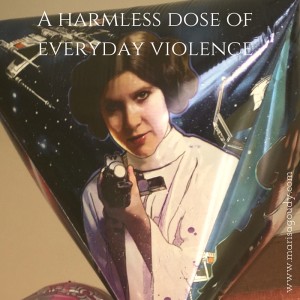 If you are using violent images without thinking about it, you’re not alone.
If you are using violent images without thinking about it, you’re not alone.
I definitely just bought a balloon with guns all over it for my six year-old daughter's birthday. In my defense, "Because Princess Leia and Han Solo" seems to sidetrack many conscious moms and dads' dedication to peaceful parenting. But the casual injection of violence is not just a Star Wars blind spot.
Writers are trained to take their readers prisoner.
Writers are told that they must “grab” or “hook” or “capture” the reader. But think about those metaphors. Their theme is violence and compulsion. They suggest a relationship you might want to have with a criminal, not a reader. - Tracy Kidder and Richard Todd, Good Prose
Marketers are groomed to force themselves upon you.
A testimonial is “punching people in face with value. - David Newman, Do It! Marketing: 77 Instant-Action Ideas to Boost Sales, Maximize Profits, and Crush Your Competition
People suffering from disease are told to arm up.
Join the fight to kill cancer. - United Cancer Foundation
Sometimes, you want to be a warrior
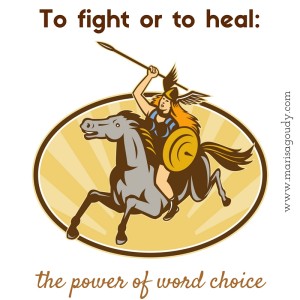 I’m not arguing that we need to become complete pacifists.
I’m not arguing that we need to become complete pacifists.
There are days when I need to enter my “warrior woman” mindset to get through the day despite the exhaustion, the stacks of dirty dishes, and the endless demands of a business that relies completely on my own ability to show up and do the work.
As long as no one gets hurt, I’m ok with writing into what Traditional Astrologist Molly Morrissey calls the “Mars energy” and using every martial word in my arsenal to combat grime, dirt, mold, stains, waste, and weeds (thanks, MKN!).
And sometimes, words do cause harm
In Having cancer is not a fight or a battle, Kate Granger asks “Why is military language used to describe cancer? These words are meant to help patients but can have the opposite effect."
I refuse to believe my death will be because I didn't battle hard enough.
Your writing matters. There are no throwaway phrases.
Don’t let a fear of offending readers you’ve never met keep you from writing and publishing. Trust yourself and trust your own good intentions.
Allow your shoddy first drafts to clunk with cliches. Mix your metaphors with wild abandon until you settle on the unifying image that ties together a section or an entire piece.
Don’t be afraid to step into the trenches and give it your best shot. But just be aware, by the time you reach your final version, you might want to say you engaged deeply with the experience and did your best.
Often, a warlike metaphor is best replaced by a straightforward truth.
Let's make our shared discourse a little more conscious and peaceful. Please share this post and subscribe to receive the Sovereign Standard each week.





